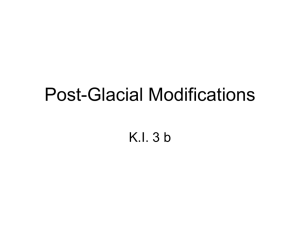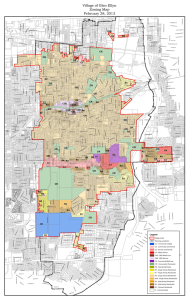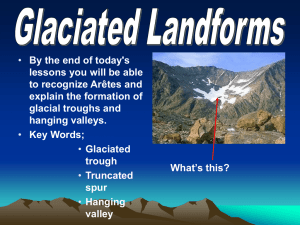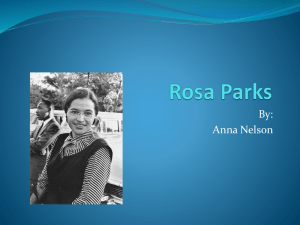Upland Glaciation
advertisement
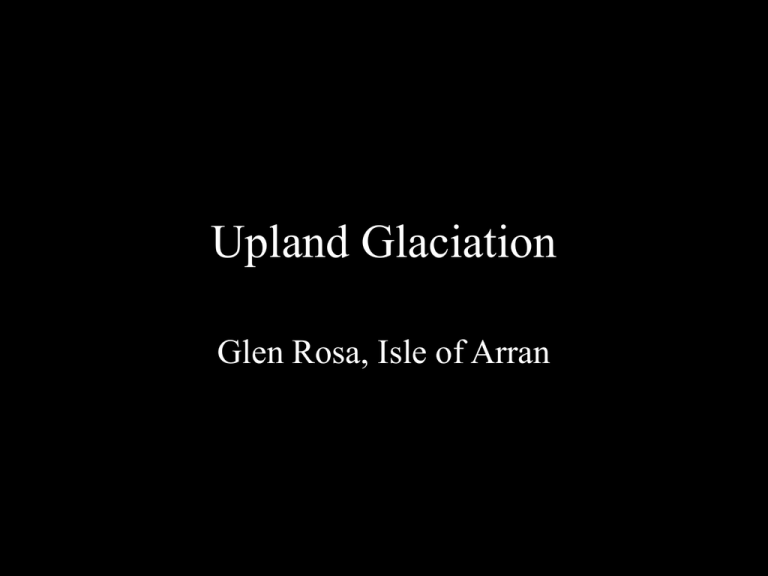
Upland Glaciation Glen Rosa, Isle of Arran A View of Glen Rosa, Looking North Arête: A’ Chir (745m) Striations: Rosa Slabs Nunatak: North Goatfell (818m) Roche Moutonnées Pyramidal Peak: Cir Mhór (799m) Corrie: Fionn Choire Arête: Witch’s Step (758m) Glacial Breach: The Saddle (432m) Flat-bottomed, vertically sided glacial trough (‘U’ shaped valley), occupied by Glenrosa Water, a misfit stream. Cir Mhór: A Pyramidal Peak Arête Arête Corrie • Goatfell (874m) is another, excellent example from Arran. • A steep-sided, isolated mountain summit produced by the convergence of the backwalls of adjoining corries. The precipitous cliffs of this horned peak, or horn, are separated by steep arêtes on the intervening ridges. • By virtue of their elevation, the pyramidal peaks on Arran were also nunataks during the glacial maximum (18000 BP). The Sleeping Warrior: An Arête Witch’s Step • The Witch’s Step (the deep ‘V’ shaped notch in the ridge) is part of the arête better known as The Sleeping Warrior. • Arête is the French term which has been widely accepted to describe a narrow, rocky and often jagged ridge which divides the steep walls of two adjacent corries. It may be on the actual crestline of a mountain or merely on a subsidiary ridge. • Lying above the ice they are subject to intense frost shattering. The Saddle: A Glacial Breach Glacial diffluence is the local overriding of a pre-glacial subsidiary watershed by glacier ice so that the ice flows through a col into a neighbouring valley. The erosive effect of ice on the col is such that it is lowered and the watershed is said to be breached. • The Saddle (432m) separates Glen Rosa from Glen Sannox. • During the glacial maximum an ice sheet 600m deep overwhelmed Arran from the north. It flowed up Glen Sannox before breaching and eroding a low point in the intervening valley side. The ice then continued flowing southwards, down Glen Rosa. Fionn Choire: A Corrie • Fionn Choire sits alongside Coire Buidhe on the southwestern flank of Cir Mhor. It represents one of the source areas for the valley glaciers that flowed into Glen Rosa during the Loch Lomond Readvance (11ka – 10ka BP). • Coirein Lochain and Coire na Ciche (The Devil’s Punchbowl) are excellent examples from elsewhere in Northern Arran. Roche Moutonnées in Glen Rosa • Roche Moutonnées can be found on the western valley side in Glen Rosa. • They are glacially moulded rock mounds exhibiting an asymmetrical form, with the gently sloping and smoothly abraded, up-valley face (stoss) contrasting with the steeper, broken, ice-plucked, downvalley face (lee). Glacial Troughs on Arran • • • Glen Rosa (top), Glen Catacol (bottom) and Glen Sannox are three of the most impressive glacial troughs in Northern Arran. A ‘U’ shaped valley is one that has been overdeepened and widened by glacial erosion, thereby severely modifying its pre-glacial form. The slopes of the former fluvial valley are considerably oversteepened by the glacier, which occupies the entire valley rather than merely the channel on the floor of the former river valley. In addition, interlocking spurs are planed-off to become truncated spurs, thereby straightening the line of the valley as it is transformed into a trough. The ‘U’ shaped valley may terminate headwards in a trough end or it may form part of a breached divide. Its flanks may be marked by debris fans where tributary streams descend steeply from neighbouring corries or from hanging valleys. Glenrosa Water and Abhainn Mór are examples of misfit streams. This is a term given to streams that are not proportionate in size to the valleys they occupy. Garbh Allt: A Hanging Valley • • • Garbh Allt is a small hanging valley which enters Glen Rosa. It originates in Coire á Bhradain (a corrie) to the west of the main glacial trough. Hanging valleys are tributary valleys with an elevation distinctly higher than that of the floor of the main glacial trough. A river flowing down the hanging valley will, therefore, descend to the main valley as a waterfall. It is generally agreed that the greater effectiveness of the main glacier in over-deepening the valley it occupied is the main reason for the discordance of the valley floors, but local geology may be an important contributory factor (as in Glen Easan).
